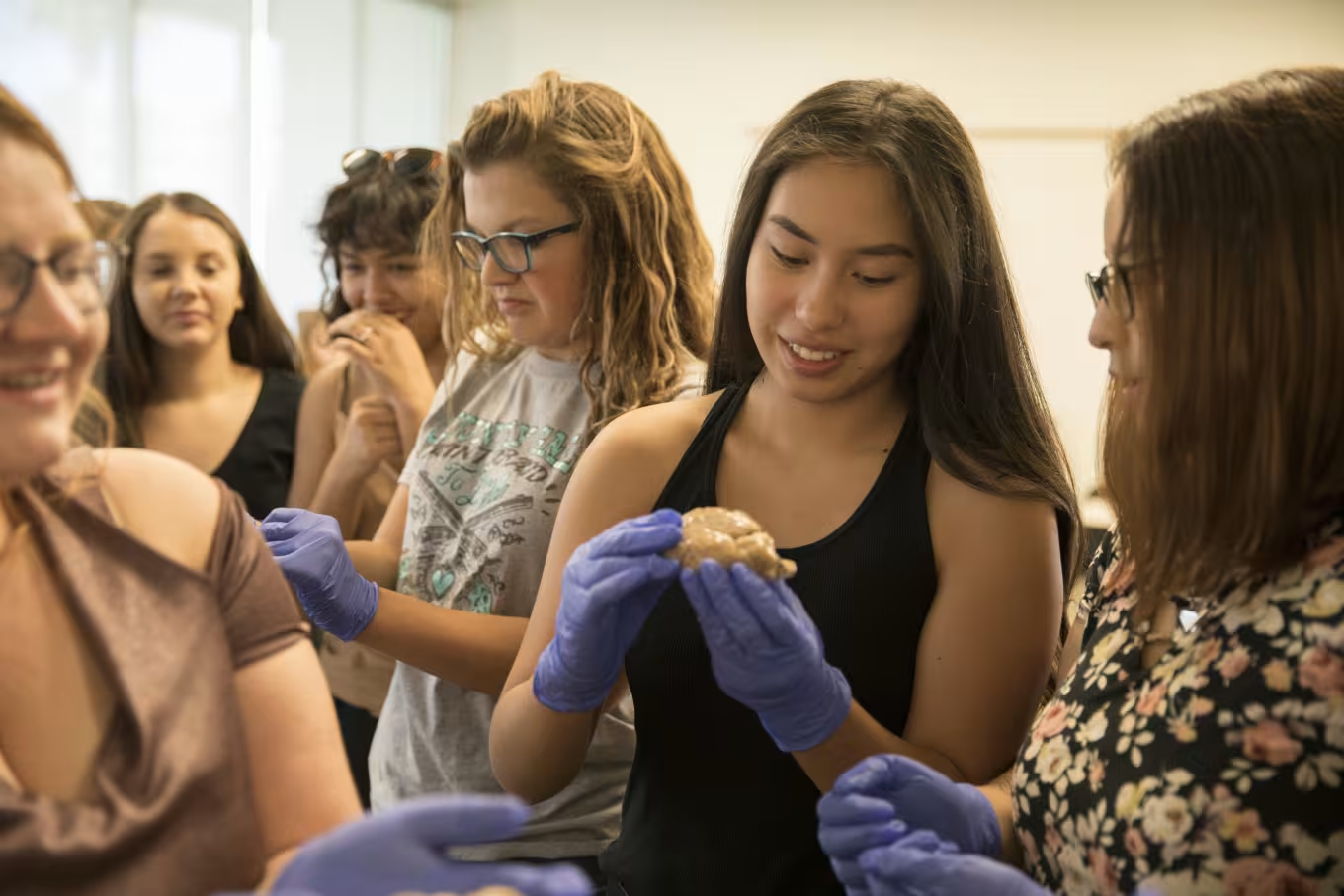We're here to help.

1 American Medical Association. (2022, Aug. 22). What Is Behavioral Health? American Medical Association. Retrieved Oct. 5, 2023.
2 Learn.org. (n.d.). What Is Behavioral Science? Learn.org. Retrieved Oct. 5, 2023.
3 Addiction Counselor. (n.d.). Behavioral Health Specialist Careers – Job Duties and Requirements. Addiction Counselor. Retrieved Oct. 5, 2023.
4 The earnings referenced were reported by the U.S. Bureau of Labor Statistics (BLS), Substance Abuse, Behavioral Disorder and Mental Health Counselors as of May 2023, retrieved on May 2, 2024. Due to COVID-19, data from 2020 to 2023 may be atypical compared to prior years. BLS calculates the median using salaries of workers nationwide with varying levels of education and experience. It does not reflect the earnings of GCU graduates as Substance Abuse, Behavioral Disorder and Mental Health Counselors nor does it reflect earnings of workers in one city or region of the country or a typical entry-level salary. Median income is the statistical midpoint for the range of salaries in a specific occupation. It represents what you would earn if you were paid more money than half the workers in an occupation, and less than half the workers in an occupation. It may give you a basis to estimate what you might earn at some point if you enter this career. Grand Canyon University can make no guarantees on individual graduates’ salaries. Your employability will be determined by numerous factors over which GCU has no control, such as the employer the graduate chooses to apply to, the graduate’s experience level, individual characteristics, skills, etc., against a pool of candidates.
As an accredited university through the Higher Learning Commission, GCU emphasizes quality of instruction in order to help graduates prepare for a variety of careers in the field. Whether you choose to earn your behavioral health science degree online or on campus, your instructors will challenge you to develop critical thinking, communication, collaboration and other important skills.
As you pursue your health science degree online or on campus, you’ll be introduced to counseling theories, treatments for addiction and substance use disorders, and you’ll examine group dynamics and processes. As you progress through this program, you will take courses in human development, abnormal psychology, and probability and statistics.
A capstone project completes the program. This course allows you to prepare a proposal for a community-based behavioral health organization on your area of focus.
Behavioral science course topics include:

Additionally, this degree may help you prepare for a master’s degree program in an area such as clinical psychology, counseling, criminal justice or social work.
Graduates with this degree may pursue work in government, private and public entities, or in the following areas or positions:
Behavioral health
Health technician
Psychiatric technician
Psychiatric aide
As you work toward your BS in behavioral science, you will be introduced to a broad perspective on each of the specific areas of this field. The goal of the behavioral science courses is to help you analyze human behavior within a Christian values-oriented environment, so that you may emphasize compassion and ethics in your own practice. This degree does not lead to licensure, but it may meet requirements for more advanced degree programs in various healthcare fields.

Before making the decision to enroll in behavioral science courses, you may wish to explore the field further. Use the following FAQs and answers to get started.
Behavioral health science and psychology are similar fields that overlap, as they both focus on mental health. However, behavioral science is a broader umbrella field that encompasses psychology as a subfield. Whereas psychology focuses on the science of mental health and its relation to human behaviors, behavioral science emphasizes the relationships and interactions between people. Furthermore, behavioral science, as an umbrella field, also touches on areas such as religious studies, philosophy and anthropology.2
A behavioral health specialist provides counseling and resources to assist people dealing with challenges like addiction, mental illness and family transitions. This role is often a collaborative one, as behavioral health specialists may refer some clients to other providers, such as psychiatrists. Specialists typically work in hospitals, clinics, schools or individual practices.3
The requirements to work as a behavioral health specialist vary by state. You should research the requirements for the state in which you plan to work. In general, however, you should expect to need a bachelor’s degree in behavioral health science.
After earning a bachelor’s in behavioral science, you may need to continue your education by earning an advanced degree.3 One graduate degree option for future behavioral health specialists is GCU’s MS in Mental Health and Wellness. Another option is the Clinical Mental Health Counseling degree.
Earning this degree can help prepare you to earn your clinical licensure as a counselor. Talk with your university advisor to learn more.
According to the U.S. Bureau of Labor Statistics, substance abuse, behavioral disorder and mental health counselors have a median annual wage of $53,710 as of May 2023.4
To accommodate all our students, GCU offers multiple formats for you to earn your BHS degree. View our modalities below to choose which one best suits your lifestyle and commitments.
GCU’s interactive digital platform allows you to access course materials from virtually anywhere as you explore ways of improving quality of life for your future clients. By taking online behavioral sciences courses, you can continue to work and make college fit around your schedule.
As an on-campus student, you can benefit from face-to-face interactions with your peers and instructors, plus enjoy all that campus life has to offer while you examine counseling theories, human development and cultural diversity in the behavioral health field.
Behavioral health science encompasses mental health issues, substance use disorders and the physical health issues that may arise from mental or behavioral health issues.1 At Grand Canyon University, the Bachelor of Science in Behavioral Health Science degree includes an in-depth look at the approaches, techniques, current trends, history, research and best practices in behavioral health.
Students who pursue an education in this field can prepare for careers that center on helping clients improve their quality of life. Graduates of this bachelor’s program at GCU may go on to help people with addiction and substance use disorders, family dynamics and trauma.

Review some of concepts and skills you will be taught throughout this program.
The College of Humanities and Social Sciences designed this BS in behavioral science around the following core competencies:
Professional Network
BHS degree students can benefit from understanding the importance of a professional network in the behavioral health field. This promotes active engagement in professional communities.
Behavioral Health Skills
Using tools such as the DSM manual and ICD codes, along with emerging brain technology, you will have the opportunity to demonstrate competency in the scope of practice, including assessment, diagnosis and treatment for clients. Clinical and documentation skills, and laws and rules are also a focus.
Cultural Competency
Examining the impact of culture, diversity and social justice on the behavioral health field may help you to better connect with future clients and patients.
Behavioral Health Information Technology
You will use diverse technology for behavioral health, such as electronic medical and health records and record keeping. The importance of privacy, security and confidentiality with patient records is emphasized.
Concepts of Behavioral Health
You will analyze behavioral health concepts such as history, current trends, theories, approaches, research and best practices.

If your dream is to make a difference in people’s lives, consider pursuing a behavioral health science career. Learn more about the BHS degree at GCU by filling out the form on this page.
Up to 90 credits, only 84 can be lower division
Credits: Fill out the Lopes Eval to find out what will transfer
Admission Requirements (Bachelor's)
OR 2.5+ Unweighted GPA and
Admission requirements may differ based on degree level, program and modality, or transfer status. Some programs of study may require a higher GPA and/or other qualifying criteria for admission. Please review full admission and program requirements in the University Policy Handbook.
*Math and reading only on a 1600 point scale (test date after 3/1/2016). SAT score of 1380 required for 2400 point scale (test date before 3/1/2016).